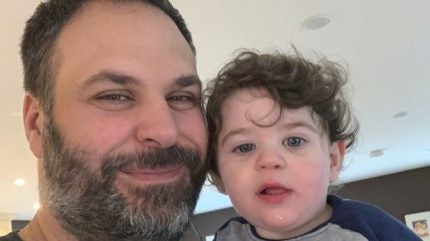
A man who set up a rare disease biotech in a bid to cure his son’s disease will soon be initiating a Phase III trial of the gene therapy in the US.
Elpida Therapeutics has been conducting a Phase I/II trial (NCT05518188) of its gene therapy candidate Melpida for patients with spastic paraplegia type 50 (SPG50). The US Food and Drug Administration (FDA) has now given the rare disease biotech the green light to initiate a Phase III study which will dose eight children and begin in August 2024.

Discover B2B Marketing That Performs
Combine business intelligence and editorial excellence to reach engaged professionals across 36 leading media platforms.
Terry Pirovolakis started Elpida Therapeutics, a not-for-profit biotech, after his son Michael was diagnosed with the rare disease at five months old.
He worked with Dr Steven Gray and Dr Xin Chen from the University of Texas Southwestern Medical Center in Dallas, who developed the gene therapy. Melpida is a gene therapy developed from a recombinant adeno-associated virus (AAV) encoding a codon-optimised human AP4M1 transgene (hAP4M1opt). SPG50 is caused by biallelic pathogenic variants in the AP4M1 gene.
SPG50 is an ultra-rare disease that only affects around 100 children worldwide. When Pirovolakis’s son Michael was diagnosed, his family was told he was the only child in Canada with the disease.
Pirovolakis, who spoke during the closing keynote of the Veeva R&D Summit at the Marriott Madrid Auditorium on 4-5 June, said that following the diagnosis, the only option he had was to find a cure.

US Tariffs are shifting - will you react or anticipate?
Don’t let policy changes catch you off guard. Stay proactive with real-time data and expert analysis.
By GlobalDataPirovolakis explains: “We were told to go home, love him, that he will be paralysed from the waist down by the age of ten and quadriplegic by the age of 20. We were told he would never speak or walk, and that he will have severe developmental delays. I just couldn’t accept that fate for my child.”
Following positive signals in pre-clinical trials, a Phase I/II trial of the candidate was initiated, and Michael was the first patient to be treated on 24 March 2022.
Since Michael was dosed, his condition seems to have stabilised, and he started to use a device to communicate with his family and care givers.
The FDA has now approved a Phase III trial of the gene therapy which will involve eight patients and is due to begin in August 2024.
During the American Society of Gene & Cell Therapy (ASCGT) Annual Meeting 2024, preliminary safety data from the Phase I/II trial was presented which demonstrated a manageable safety profile.
If approved, Pirovolakis hopes that SPG50 tests will be conducted during newborn screening so that the drug can be administered before symptoms can develop, with hopes that this early administration could allow the child to develop at the same rate as children without the condition.
Elpida also acquired a gene therapy for Charcot Marie Tooth disease type 4J (CMT4J), for which there are only 24 cases globally. The candidate, named Elpida-02, is pre-clinical but Elpida hopes to soon initiate a Phase I trial of the candidate.





